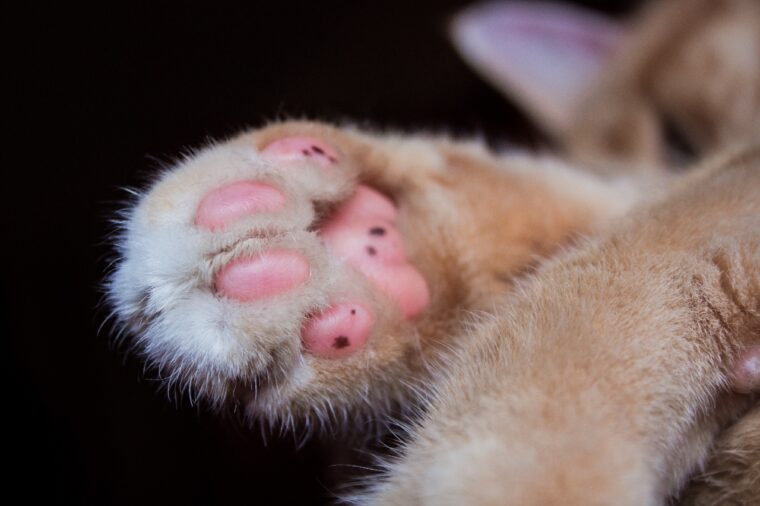
Our cats’ paws are an important part of their bodies—after all, they need them to walk, run, jump, and play—so keeping paws healthy is vital. Unfortunately, it’s not an area we tend to check on a lot (partially because many kitties don’t like having their paws touched). But the paws are something you should check on occasionally to ensure they’re healthy.
If you’ve taken a look at your pet’s paws recently and found them peeling, you’re probably wondering why they’re doing that and if it’s a normal feline thing or not. Below, you’ll find the most common reasons a cat’s paws will begin peeling, along with answers to people’s most frequently asked questions about this phenomenon.
What Are the Signs of Peeling Paws?
First things first, what should you be looking for when you check your kitty’s paws? Peeling skin, of course, but there are other signs that you might overlook if you aren’t careful. Here’s what to watch for:

And don’t just look at the skin that’s easily visible on your pet’s paws! Check the skin beneath the fur, each nail, and all paw pads, too.
The 7 Reasons Your Cat’s Paws Could Peel
There are a handful of reasons your cat’s paws could peel. Here are the seven main reasons your cat may have peeling paws!
1. Allergic Reaction
Our four-legged friends can suffer from allergies just like we do. These allergies can come about due to things in a cat’s environment, a reaction to something eaten, or because of a bite from a flea or insect. And these allergies can lead to peeling paws.
The most common sign your pet is dealing with allergies? They will be extra itchy, which will cause them to groom more than usual. And if the paws are itchy, constant biting or licking at them could lead to peeling skin. Inflamed skin and hair loss are also commonly seen if your cat has underlying allergies.
If this is a possible cause of your kitty’s peeling paws, you’ll want to visit your vet to figure out what your pet is allergic to.

2. Autoimmune Issues
Another reason peeling paws can occur is due to autoimmune disease—in this case, pemphigus foliaceus, the most common autoimmune disorder in felines. However, if this is the reason for your cat’s peeling paws, then you’ll generally see other signs of this disease elsewhere. These include crust, scale and pustules mainly affecting the head, ears, footpads, nail beds and around the nipples. The prognosis is generally good with timely treatment, but many cats need long-term immunosuppressive medication. If your feline is showing any of these signs you need to get them to the vet for diagnosis as soon as possible.
3. Related to a Cat’s Behavior
Specifically, grooming. While grooming is a natural instinct (and one cats engage in often), some felines go overboard with it. Typically, the reasons for overgrooming include allergies, pain, infection or stress and behavioral reasons.
If your cat is grooming too much, you’ll see not only peeling paws but also hair loss and sometimes irritated, inflamed skin and scabs. Your vet will do an exam to see if the reason for overgrooming is due to an underlying medical issue.
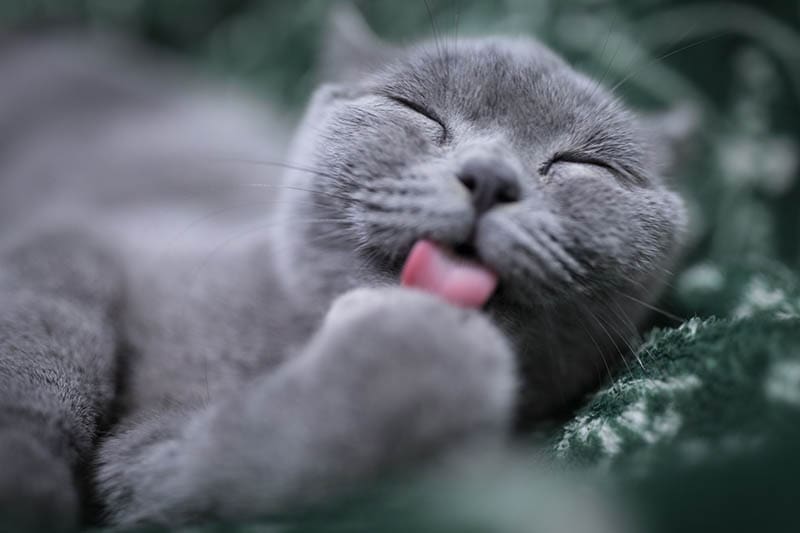
4. Burns
The most common type of burns to the paws are thermal burns if your kitty jumps onto a stovetop. They can also occur if a cat runs over a hot road or metal roof. Chemical burns to the paws happen when they are exposed to things like acids, drain cleaners and paint thinners.
If you see red, peeling skin on the paws or blisters, there’s a good chance it’s due to a burn. And if that’s the case, you should contact your vet as soon as possible.
5. Dryness
Or it could simply be that the kitty has dry skin. After all, your cat’s paws come into contact with a bunch of different surfaces, so they can get a bit rough and even dry. Dry skin can also occur due to especially dry air, excessive grooming, and extreme weather. And dry skin can lead to peeling paws (it can also be uncomfortable and occasionally painful for your pet).
The good news is that dry skin is something you can usually treat at home with paw repair creams. It’s a good idea to speak with your vet first to make sure it is simply dry skin, and about which treatment would be best for your pet.
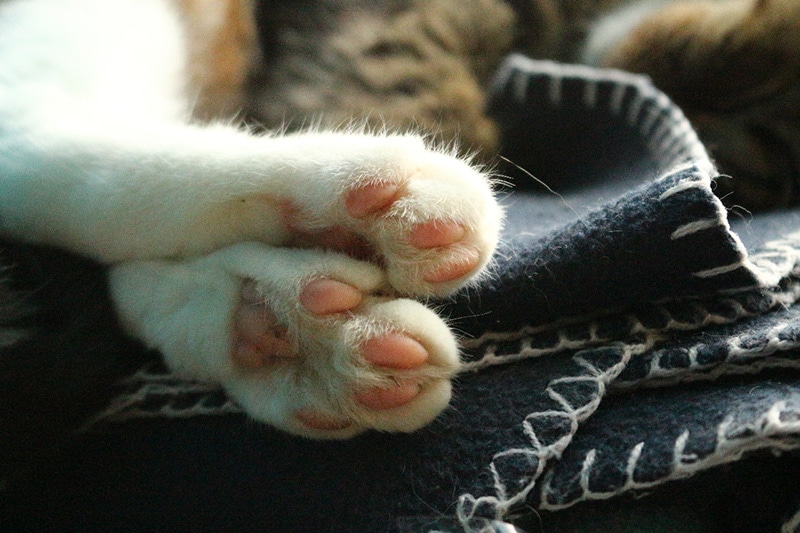
6. Infection
Peeling paws can also result from infection. One example is ringworm. Despite the name, ringworm isn’t actually caused by worms but rather a fungus. And when a feline gets ringworm, you’ll see patches of hair loss on their coats, red, flaky skin, and possibly peeling paws. If you think your pet has ringworm, you definitely need to visit your vet for treatment because ringworm can be transmitted to you from your kitty!
7. Injury
Finally, your cat’s paws could be peeling because of an injury. Injuries to the paws can occur from cuts, foreign objects being lodged in them, abrasions, and more. Unless the injury appears very minor and your cat is not in discomfort, get any wounds checked out by your vet.
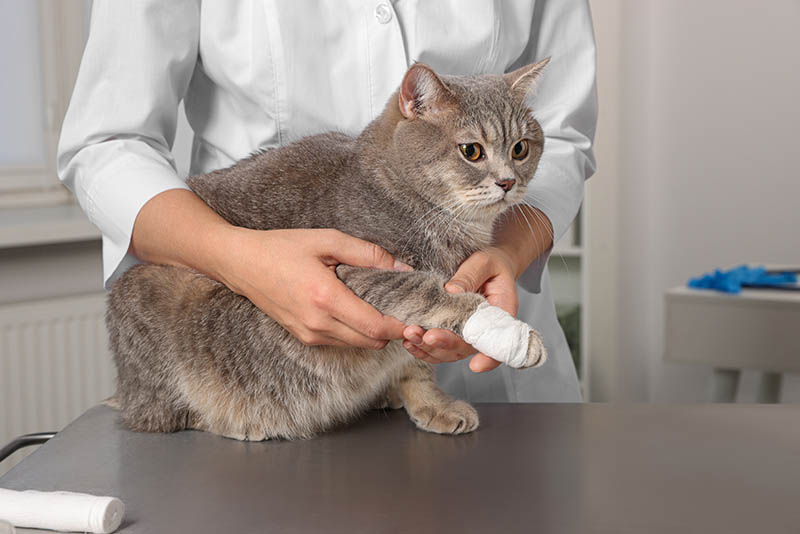
 FAQs About Peeling Paws
FAQs About Peeling Paws
People usually have a few common questions when it comes to a cat with peeling paws, so here are some answers!
How often should I check my cat’s paws?
Once a week should suffice, though if you see signs your pet has something wrong with its paws, try to give them a look immediately.
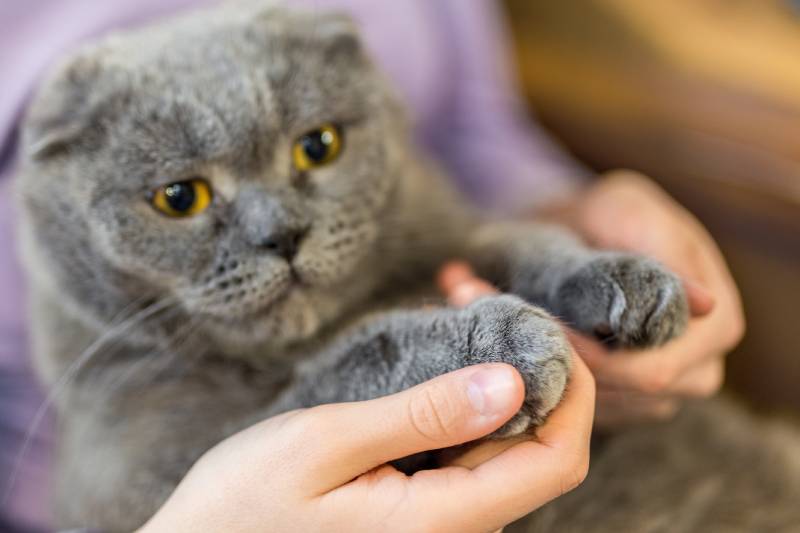
How can I help keep my kitty’s paws healthy?
The best ways to aid in keeping your pet’s paws healthy are by feeding the cat a high-quality food that provides all the nutrients it needs, trimming nails regularly, and doing regular checks of the paw pads so you can catch issues early.
If you're looking for an easy, safe way to clean your pet well-formulated wipes like Hepper's Wash Wipes might be just the thing. These premium wipes are designed to gently and effectively remove the dirt and grime that sticks to your pets's fur. The hypoallergenic formula is infused with soothing, moisturizing ingredients that are safe for all life stages.
At Pet Keen, we've admired Hepper for many years, and decided to take a controlling ownership interest so that we could benefit from the outstanding designs of this cool pet company!
Can I prevent peeling paws?
In some cases, but not all. For example, you can keep your pet indoors to avoid hot tarmac or extreme weather and be careful about using any chemicals and make sure your cat doesn’t have any access to them. Injuries and allergies aren’t usually avoidable.
Final Thoughts
There are quite a few reasons your cat may have peeling paws. Some of these can be as simple as dry skin, but peeling paws can also be a sign of something more serious such as an infection, burn or autoimmune condition. If you’ve noticed your cat’s paws peeling, and especially if your cat has other signs, you’ll want to visit your vet for a diagnosis and treatment.
See also:
- Can Dogs Eat Dairy? Vet-Reviewed Nutritional Guide & FAQ
- Can Ferrets Use Cat Litter? Vet Approved Types & Tips
Featured Image Credit: Nile, Pixabay








